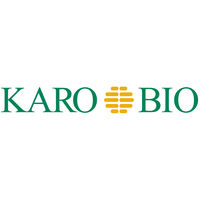预约演示
更新于:2025-05-07

Karo Bio USA, Inc.
更新于:2025-05-07
概览
关联
5
项与 Karo Bio USA, Inc. 相关的药物靶点 |
作用机制 ERβ激动剂 |
在研机构 |
在研适应症 |
最高研发阶段药物发现 |
首次获批国家/地区- |
首次获批日期- |
靶点 |
作用机制 ERβ激动剂 |
在研机构- |
在研适应症- |
最高研发阶段终止 |
首次获批国家/地区- |
首次获批日期- |
靶点 |
作用机制 THR激动剂 |
在研机构- |
在研适应症- |
非在研适应症 |
最高研发阶段终止 |
首次获批国家/地区- |
首次获批日期- |
100 项与 Karo Bio USA, Inc. 相关的临床结果
登录后查看更多信息
0 项与 Karo Bio USA, Inc. 相关的专利(医药)
登录后查看更多信息
10
项与 Karo Bio USA, Inc. 相关的文献(医药)2008-06-01·Combinatorial Chemistry & High Throughput Screening4区 · 医学
State-Selective Binding Peptides for Heterotrimeric G-Protein Subunits:Novel Tools for Investigating G-Protein Signaling Dynamics
4区 · 医学
Review
作者: David P. Siderovski ; Francis S. Willard ; J. Kevin Ramer ; Christopher A. Johnston ; C. Natalia Roques ; Rainer Blaesius
2005-07-27·Drug Discovery Series
High Throughput and High Content Screening Using Peptides
作者: Carlson, Robert O. ; Hamilton, Paul T. ; Hyde-Deruyscher, Robin
2003-09-01·Antimicrobial Agents and Chemotherapy2区 · 医学
Intracellular Expression of Peptide Fusions for Demonstration of Protein Essentiality in Bacteria
2区 · 医学
Article
作者: Benson, R. Edward ; Gottlin, Elizabeth B. ; Christensen, Dale J. ; Hamilton, Paul T.
2
项与 Karo Bio USA, Inc. 相关的新闻(医药)2015-04-29
HUDDINGE, Sweden--(BUSINESS WIRE)--Regulatory News:
Karo Bio (STO:KARO)
THE JANUARY-MARCH PERIOD 2015 IN BRIEF
· Net sales amounted to MSEK 0.4 (6.4)
Help employers find you! Check out all the jobs and post your resume.
2007-09-20
STOCKHOLM, Sweden--(BUSINESS WIRE)--Regulatory News: Karo Bio announced today that it has been informed by its research partner, Wyeth Pharmaceuticals, a division of Wyeth, that development of LXR-623 has been discontinued. The compound had been in phase 1 testing for the treatment of atherosclerosis. While LXR-623 demonstrated efficacy on biomarkers for atherosclerosis, it had an unfavorable pro further development.
Karo Bio and Wyeth remain committed to the research partnership and to advancing a new lead compound under the terms of the collaboration, which was recently extended until August 31, 2008.
The collaboration between Karo Bio and Wyeth targets the Liver X Receptor (LXR), with the aim to develop new treatments for atherosclerosis. LXR regulates transport proteins, including ABCA1 and ABCG1, which promote reverse cholesterol transport (transport of cholesterol from peripheral tissues to the liver). Furthermore, it has been demonstrated that small molecular compounds that activate LXR have anti-atherogenic properties.
"Unfortunately compounds do fail in the process but this is part of the development of pharmaceuticals. We remain optimistic about LXR as a target for treatment of atherosclerosis and for the prospects for new molecules for development. The learnings generated from the LXR-623 program will be valuable as additional potential compounds move forward. We have recently extended our collaboration with Wyeth and we are pleased with Wyeth's commitment to the program", says Per Olof Wallstrom, President of Karo Bio.
Facts about Karo Bio Karo Bio is a drug discovery and development company specializing in nuclear receptors for the development of novel pharmaceuticals with focus on metabolic diseases.
The company has expanded from being a drug discovery company by adding in-house preclinical and clinical development resources and competence for development of drugs to treat metabolic diseases. The company has a strong project portfolio with innovative molecules that primarily targets diseases such as diabetes, atherosclerosis and dyslipidemia. In all of these areas there are significant market opportunities and a growing need for new pharmaceuticals with new mechanisms of action.
In addition to the proprietary projects Karo Bio has two strategic collaborations with international pharmaceutical companies and one biotech collaboration for development of innovative therapies for the treatment of common diseases.
Karo Bio is listed on the OMX Nordic Exchange Stockholm AB since 1998 (Reuters: KARO.ST).
This press release is also available online at: and
This information was brought to you by Cision
Contact:
Per Olof Wallstrom
President & Chief Executive Officer
Telephone: +46 8 608 60 20
or
Per Otteskog
Senior Vice President
Telephone: +46 8 608 60 18
Source: Karo Bio
合作小分子药物
100 项与 Karo Bio USA, Inc. 相关的药物交易
登录后查看更多信息
100 项与 Karo Bio USA, Inc. 相关的转化医学
登录后查看更多信息
组织架构
使用我们的机构树数据加速您的研究。
登录
或

管线布局
2026年03月01日管线快照
管线布局中药物为当前组织机构及其子机构作为药物机构进行统计,早期临床1期并入临床1期,临床1/2期并入临床2期,临床2/3期并入临床3期
其他
5
登录后查看更多信息
药物交易
使用我们的药物交易数据加速您的研究。
登录
或

转化医学
使用我们的转化医学数据加速您的研究。
登录
或

营收
使用 Synapse 探索超过 36 万个组织的财务状况。
登录
或

科研基金(NIH)
访问超过 200 万项资助和基金信息,以提升您的研究之旅。
登录
或

投资
深入了解从初创企业到成熟企业的最新公司投资动态。
登录
或

融资
发掘融资趋势以验证和推进您的投资机会。
登录
或

生物医药百科问答
全新生物医药AI Agent 覆盖科研全链路,让突破性发现快人一步
立即开始免费试用!
智慧芽新药情报库是智慧芽专为生命科学人士构建的基于AI的创新药情报平台,助您全方位提升您的研发与决策效率。
立即开始数据试用!
智慧芽新药库数据也通过智慧芽数据服务平台,以API或者数据包形式对外开放,助您更加充分利用智慧芽新药情报信息。
生物序列数据库
生物药研发创新
免费使用
化学结构数据库
小分子化药研发创新
免费使用

